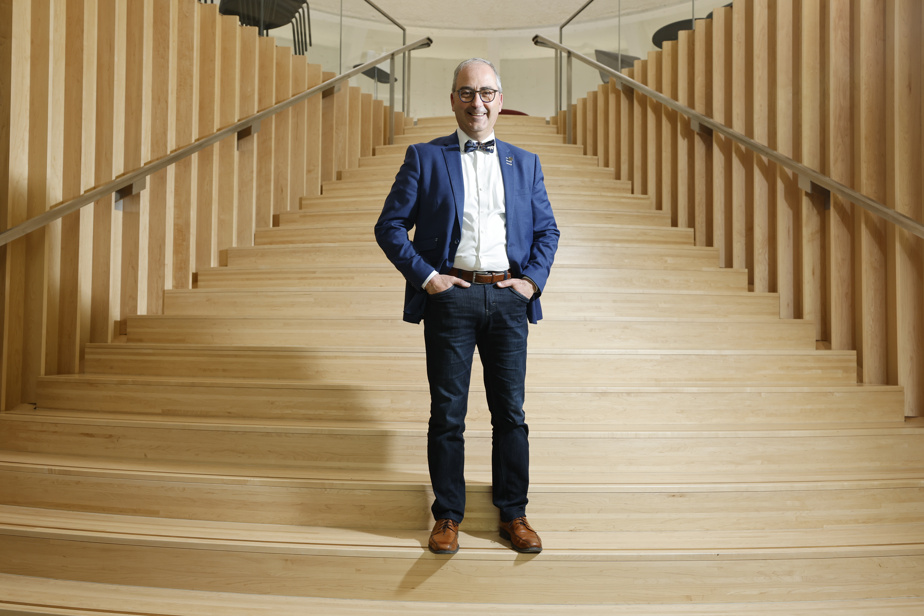(Montreal) Why are Quebec companies investing less in innovation? That’s the question that preoccupies the province’s chief innovator, Luc Sirois, who has set himself the task of sparking a desire for innovation among Quebecers.
Stephane Rolland
Canadian Press
Sitting in a small office where a whiteboard wall displays the remains of a brainstorming session, Mr. Sirois says he is troubled by the fact that business spending on research and development (R&D) is declining in Quebec.
“I was in shock [lorsque j’ai constaté ce déclin], he says in an interview with The Canadian Press. In Quebec, we are creative, we are entrepreneurs, we develop. Yes, I go to bed and wake up in the morning thinking about it, and asking myself: What do we need to do in order for things to change course structurally? »
The Conseil de l’innovation du Québec, of which it serves as its CEO, has been given a mandate by the Ministry of Economy and Innovation to help it achieve this change of direction. The organization, which was created in December 2020, is at the heart of Quebec’s Strategy for Research and Investment in Innovation 2022-2027 (SQRI), unveiled last week.
Several statistics show that Quebec companies are lagging behind in terms of innovation, in particular: the decrease in R&D spending, the decrease in the number of companies developing new products and services or the percentage of companies that have digitized them.
In Quebec, we are particularly good at academic research, but business innovation is on the decline.
Luc Sirois, Chief Innovator in Quebec
The decline in commercial investment in intellectual property products worries the chief economist of the Desjardins group, Jamie Jane. In the fourth quarter of 2021, this type of investment decreased by 2.8% compared to its level in 2019, that is, before the pandemic. In Ontario and the United States, these increased by 10.7% and 14.0%, respectively.
In addition to the numbers, these statistics are of real importance to Quebecers, because innovation is a necessary “ingredient” to increase per capita GDP, as Mr. Jean explains during an interview. It is related to the standard of living of the population and its ability to provide effective public services. »
Pending questions
Mr. Sirois admits he does not know what is slowing innovation in Quebec. This is a puzzle that Conseil’s team of twelve employees will try to solve. He can also count on the support of the “wise men” on his advisory committee, chaired by the dean of Laval University, Sophie Damour, whose job is to advise the government.
The council is working to launch an “Innovation Scale” that will attempt to paint an accurate picture of research and innovation in Quebec by region and sector. The first version of the barometer will be published this fall, but the lead creator assures that the tool will be enriched in its later versions. “The measure is the economy, social innovation, the fight against climate change and the question of talent.”
The board should also pilot a study on research and development funding to see if public money is being used effectively to spur innovation. The mandate will be entrusted to external experts. “In the R&D Refundable Tax Credit, 2.5 billion is given to businesses. Despite this, business spending is declining. [Est-ce que] Does it work well? The question must be asked. »
The project does not start with a preconceived idea, however, stresses Mr. Sirois. The intention is not necessarily to reduce public funding for research and development. “Wherever it works, you don’t want to undo it. It’s subtle. Perhaps the answer is to increase it.”
The council will also play a role in this field by directing entrepreneurs to the appropriate resources among many governmental, regional, sectoral and university entities, explains Mr. Siruis. “There are a lot of resources. Business is mixed. We let them breathe. We explain things to them calmly and we can direct them to these organizations.”
Mr. Sirois also wants to create an informal network of 300 economic development professionals who work in various institutions. The first cohort of about forty professionals should receive training this fall. “We want to provide them with training, manuals, and computer tools. He will have a ‘red phone’ to reach us.”
Taste of failure
Beyond economic policies, Quebec’s chief innovator hopes to bring about a change of mindset that encourages innovation. He believes that the collective psyche is too “afraid” of the idea of suffering from failure. He says he notices this reluctance on the part of entrepreneurs when it comes time to consider changes within their company. There is an alarm at the risks that are here. »
Failure is inevitable when you want to change the way things are done. Mr. Sirois compares a hockey player trying to score a goal. “If you only do shot, when you’re sure it will work, well, let’s see. We know that in hockey, you have to shoot multiple times to score. This is how it works. »
We can accept failure with caution, nuance Mr. Sirois. The best approach is to conduct small, focused experiments and put the rubber to the tests that give the best results. “You want to fail quickly to know which project to stop and overinvest [dans] who works. »

